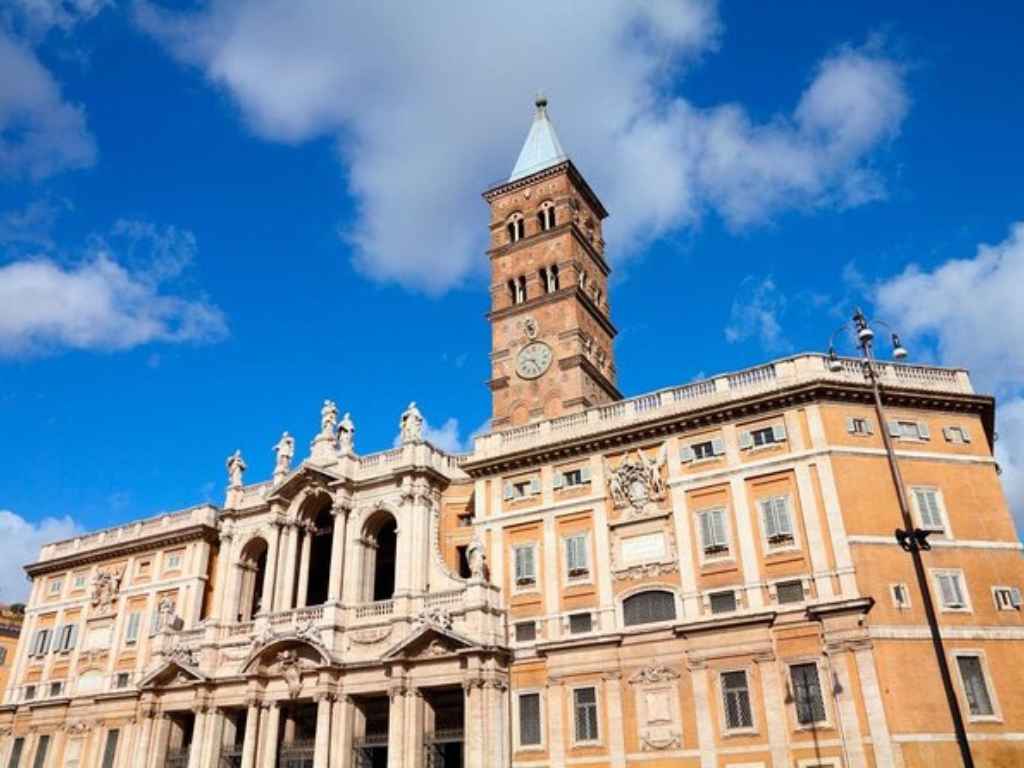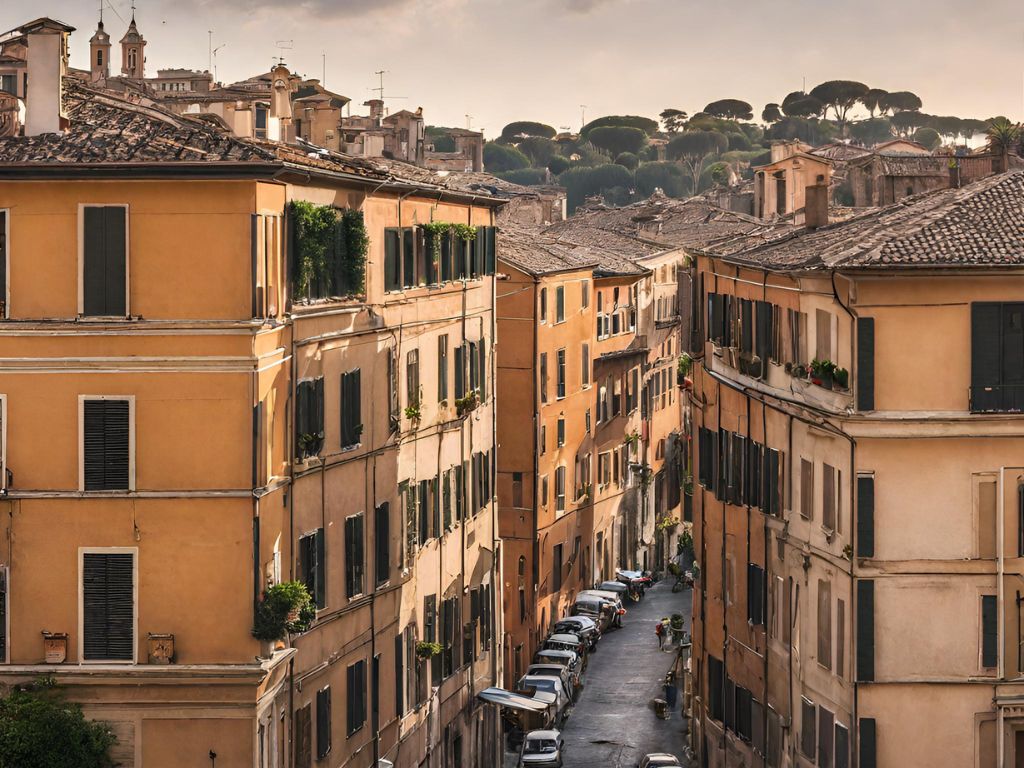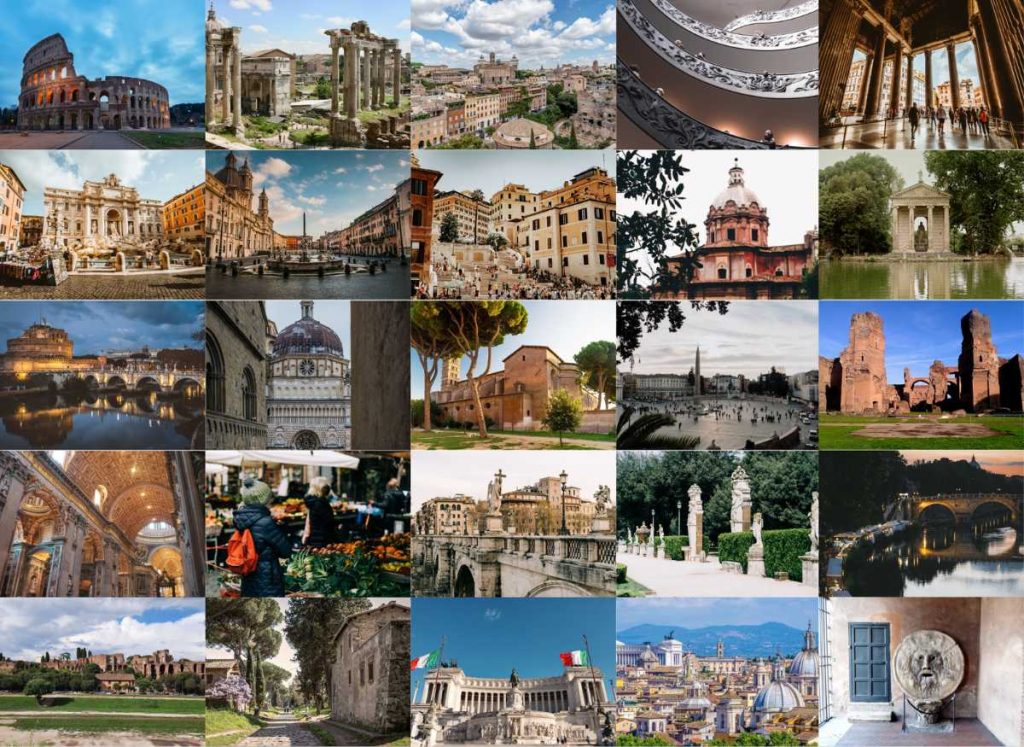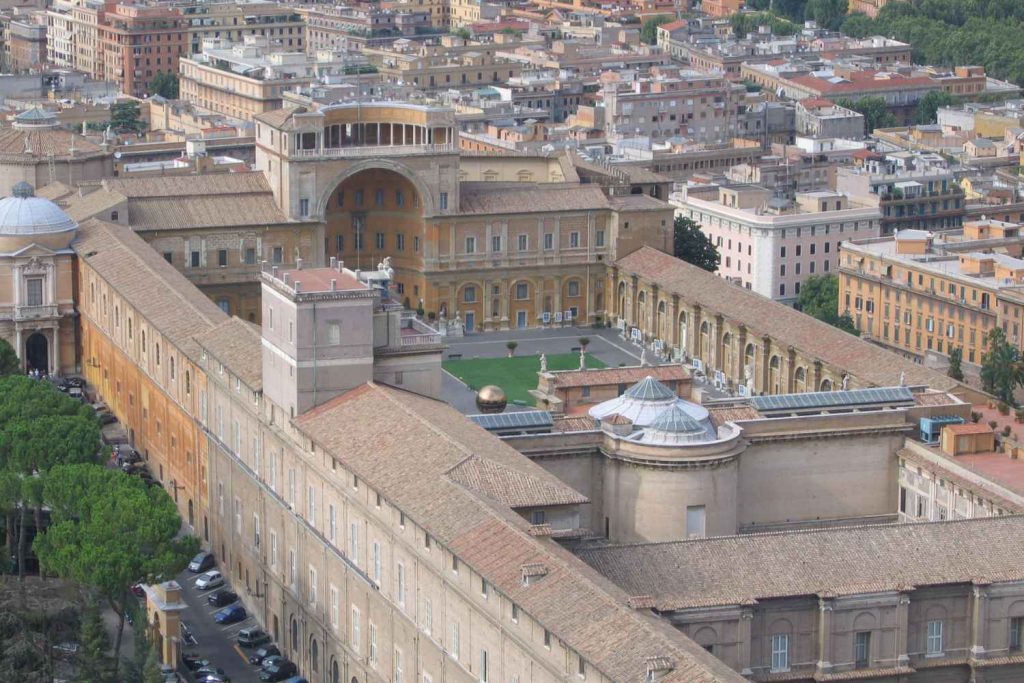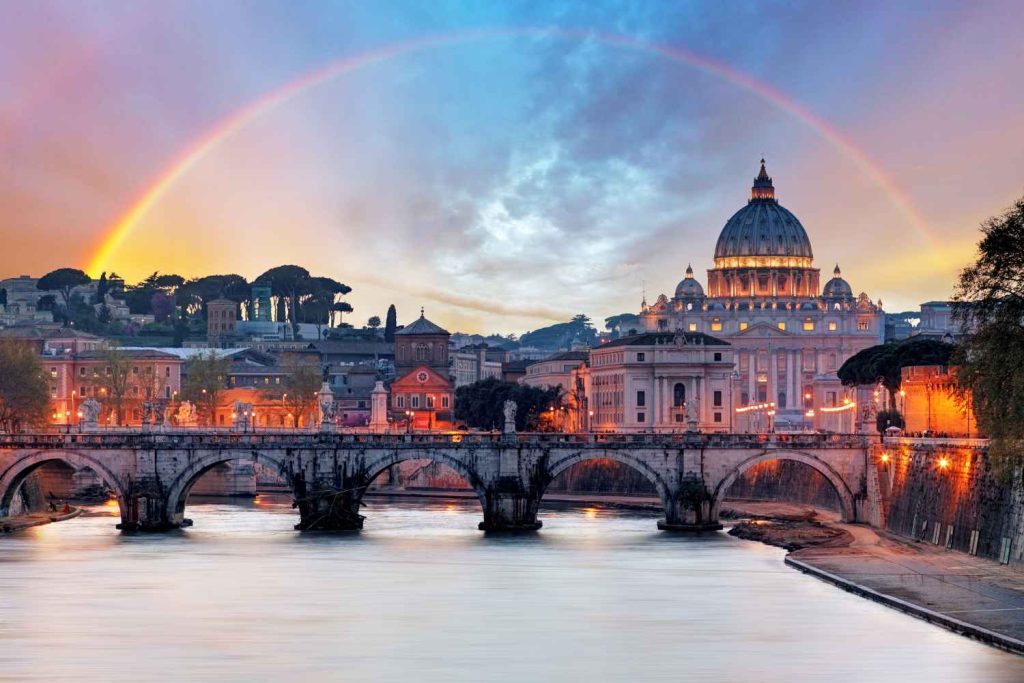We will take you on a journey through the history, art, and mystique of this magnificent basilica, allowing you to immerse yourself in the allure of Rome’s spiritual and cultural heritage.
In the enchanting streets of Rome, the Basilica di Santa Maria Maggiore stands as a testament to the city’s rich history, art, and devotion. This splendid basilica, also known as the Basilica of St. Mary Major, is one of the four major papal basilicas in Rome and a remarkable masterpiece of architecture. Its centuries-old legacy and intricate design continue to captivate travellers from all corners of the globe.
Origins Shrouded in Divine Mystique
The origins of the Basilica di Santa Maria Maggiore date back to the 4th century, during the reign of Pope Liberius. Legend has it that the Virgin Mary herself appeared in a dream to the Pope and a wealthy Roman patrician, John, revealing her wish for a church to be built in her honour. The next day, in the midst of a scorching Roman summer, snow miraculously fell on the Esquiline Hill, outlining the dimensions of the church. This event led to the construction of the basilica, which was completed in 432 AD.
The architectural style of Santa Maria Maggiore combines elements of Early Christian and Baroque design, resulting in a harmonious blend of antiquity and grandeur. Its façade, adorned with intricate mosaics, presents a striking first impression. Step inside, and you’ll find yourself immersed in a world of opulent frescoes, marble columns, and a captivating sense of history.
Art and Architecture
One of the most remarkable features of Santa Maria Maggiore is its breathtaking mosaics. The triumphal arch above the main altar, designed by the celebrated artist Jacopo Torriti, depicts scenes from the life of the Virgin Mary, including her miraculous appearance to Pope Liberius. The mosaics’ vibrant colours and meticulous craftsmanship make them a true visual delight, transporting visitors to a bygone era.
Another highlight is the coffered ceiling, which is adorned with gold leaf and features intricate designs reminiscent of the Renaissance period. The contrast between the gold and the deep blue background creates a celestial atmosphere, symbolising the divine presence that permeates the basilica.
The basilica also houses a remarkable collection of relics and artwork, including the famous “Salus Populi Romani” icon, believed to be painted by St. Luke himself. This revered icon is thought to have miraculous powers, and it is venerated by both locals and pilgrims alike.
The Basilica’s interior is a treasure trove of art, with numerous chapels featuring paintings and sculptures by renowned artists such as Gian Lorenzo Bernini, Giovanni Battista Crespi, and Guercino. Each chapel tells a unique story, making Santa Maria Maggiore not just a place of worship but also a living museum of Roman Catholic art.
Spiritual Sanctum and Cultural Treasury
Beyond its artistic splendour, the Basilica di Santa Maria Maggiore holds profound spiritual significance for both locals and pilgrims. It is considered one of the most important Marian shrines in the world and plays a vital role in Roman Catholic liturgical life.
The basilica’s grandeur serves as a reminder of the enduring faith of the Roman Catholic Church. Pilgrims from across the globe come to Santa Maria Maggiore to seek solace, offer prayers, and connect with the divine. The basilica’s peaceful ambiance and the ethereal beauty of its interior create a sense of serenity that envelops all who enter.
Historical Milestones and Celebrations
Throughout its history, the Basilica di Santa Maria Maggiore has been the backdrop for several significant events. One of the most notable is the annual celebration of the Feast of the Assumption of Mary on August 15th. On this day, the basilica is adorned with a sea of flowers, and a stunning procession winds its way through the streets of Rome, drawing thousands of participants and spectators.
Another remarkable event is the traditional “White Mass” celebrated on the Feast of Our Lady of the Snows (August 5th), commemorating the miraculous snowfall that marked the basilica’s construction. This mass is attended by Rome’s firefighters, who carry a statue of the Virgin Mary, and is a moving display of devotion and gratitude.
Frequently Asked Questions about Basilica di Santa Maria Maggiore in Rome
What are the must-see artistic features inside the basilica?
The Basilica di Santa Maria Maggiore is renowned for its breathtaking mosaics, particularly the triumphal arch above the main altar. These mosaics, designed by Jacopo Torriti, depict scenes from the life of the Virgin Mary. Additionally, the basilica houses a revered icon called “Salus Populi Romani,” believed to be painted by St. Luke himself.
More articles you might like...
All about Vatican City
Commonly Asked Rome Questions
Rome Accommodation
Rome Food and Drink
Rome History and Culture
Rome Neighbourhoods
Rome Tours and Must-See Attractions
Is Basilica di Santa Maria Maggiore a place of active worship?
Yes, it is an active place of worship for the Roman Catholic Church. Daily masses are held in the basilica, and it plays a significant role in Roman Catholic liturgical life. Visitors are encouraged to be respectful of worshippers when touring the basilica.
More articles you might like...
All about Vatican City
Commonly Asked Rome Questions
Rome Accommodation
Rome Food and Drink
Rome History and Culture
Rome Neighbourhoods
Rome Tours and Must-See Attractions
Are there any significant events or celebrations held at the basilica?
Yes, two notable events are celebrated at the Basilica di Santa Maria Maggiore. The Feast of the Assumption of Mary, held on August 15th, features a grand procession through the streets of Rome and a vibrant display of flowers within the basilica. Another event is the “White Mass” on the Feast of Our Lady of the Snows (August 5th), which involves Rome’s firefighters and pays homage to the miraculous snowfall associated with the basilica’s history.
More articles you might like...
All about Vatican City
Commonly Asked Rome Questions
Rome Accommodation
Rome Food and Drink
Rome History and Culture
Rome Neighbourhoods
Rome Tours and Must-See Attractions
Can I take photographs inside the basilica?
Photography is generally allowed inside the basilica, but it is essential to be respectful and adhere to any posted restrictions. Flash photography is often discouraged to preserve the integrity of the artwork and mosaics.
More articles you might like...
All about Vatican City
Commonly Asked Rome Questions
Rome Accommodation
Rome Food and Drink
Rome History and Culture
Rome Neighbourhoods
Rome Tours and Must-See Attractions
What is the best time to visit Basilica di Santa Maria Maggiore to avoid crowds?
To experience the basilica with fewer crowds, it’s advisable to visit during the early morning hours or on weekdays, as it tends to be busier during weekends and peak tourist seasons.
More articles you might like...
All about Vatican City
Commonly Asked Rome Questions
Rome Accommodation
Rome Food and Drink
Rome History and Culture
Rome Neighbourhoods
Rome Tours and Must-See Attractions
Is there an entrance fee to visit Basilica di Santa Maria Maggiore?
No, there is no entrance fee to visit the basilica. It is open to the public for free. However, donations are welcomed to support its upkeep and preservation.
More articles you might like...
All about Vatican City
Commonly Asked Rome Questions
Rome Accommodation
Rome Food and Drink
Rome History and Culture
Rome Neighbourhoods
Rome Tours and Must-See Attractions
Can I attend a mass or religious service at the basilica as a visitor?
Yes, visitors are welcome to attend the masses and religious services held at the basilica. It’s a unique opportunity to experience the spiritual ambiance of this historic church.
More articles you might like...
All about Vatican City
Commonly Asked Rome Questions
Rome Accommodation
Rome Food and Drink
Rome History and Culture
Rome Neighbourhoods
Rome Tours and Must-See Attractions
Is there a dress code for visitors to the basilica?
While there is no strict dress code, it is advisable to dress modestly when visiting out of respect for its religious significance. Avoid wearing revealing clothing, and consider covering your shoulders and knees when entering the basilica.
More articles you might like...
All about Vatican City
Commonly Asked Rome Questions
Rome Accommodation
Rome Food and Drink
Rome History and Culture
Rome Neighbourhoods
Rome Tours and Must-See Attractions
Visiting the Basilica di Santa Maria Maggiore is a journey through time and faith, an opportunity to immerse oneself in the rich tapestry of Rome’s history and culture. From its ancient origins to its stunning mosaics, artwork, and spiritual significance, this basilica is a testament to the enduring power of art and faith in shaping the identity of a city and its people.
As you stand beneath the gilded coffered ceiling or admire the centuries-old icons, you can’t help but feel a sense of awe and reverence. Whether you are a devout pilgrim or a curious traveller, the Basilica di Santa Maria Maggiore invites you to explore the depths of its beauty and the richness of its history, leaving an indelible mark on your heart and soul. Rome, with all its treasures, has a jewel in Santa Maria Maggiore, a place where the divine and the artistic merge to create an unforgettable experience.
More articles you might like...
You can find more great Rome content in the following categories;
All about Vatican City Commonly Asked Rome Questions Rome Accommodation Rome Food and Drink Rome History and Culture Rome Neighbourhoods Rome Tours and Must-See Attractions
